Summary 
Traditionally costumed and staged production with a masterful portrayal of a heartbroken Shylock: intelligent and articulate, proud and devout, deceived and misused, mocked and spit upon. Antagonist to an array of beautiful Christian heroes, the usurer's lust for vengeance is illuminated as a meaningless joke to be capitalized upon in an intelligently directed outdoor production intercut with scenes of clever humor. Brilliantly depicted irony in a villain not so villainous and heroes not so heroic.
Design
Directed by Sharon Ott. Set by Troy Hemmerling. Costumes by David Kay Mickelsen. Lights by Donna Ruzika. Compositions and sound by Lindsay Jones. Fights by T. Anthony Marotta.
Cast
Gary Neal Johnson (Antonio), Michael A. Harding (Salerio), John Oswald (Solanio), Grant Goodman (Bassanio), Ryan Imhoff (Gratiano), Daniel Molina (Lorenzo), Emily Trask (Portia), Chelsea Steverson (Nerissa), Tony Amendola (Shylock), Monica Lopez (Jessica), Aaron Galligan-Stierle (Launcelot Gobbo), Jesse Easley (Prince of Morocco/Jailer), Dave Barrus (Prince of Aragon).
Analysis
Sharon Ott's traditional The Merchant of Venice is staged in Renaissance Italy with sets, lighting, and an atmospheric score designed by the same three artists as the other Utah Shakespearean Festival productions. Green topped columns of gold-laced rusty red support the balcony and an upstage scrim of wall shows plaster peeling from red bricks, alluding to some lost luster and advancing decay. The melancholy Antonio, like his fellow Venetians, wears rich fabrics touched with leather, a heavy white collar over his doublet, and knee-length boots. Ott presents handsome young Christian heroes in 1.1, with a dashing Bassanio in yellow - along with curly blond hair - embracing old friend Antonio and kissing him on both cheeks, a towering heart-on-his-sleeve Gratiano in an orange-tunic and sporting long black hair with a full beard, and a diminutive Lorenzo in dark brown, horse-playing manfully with Gratiano. Ott establishes her heroes from the onset, presenting clean-cut protagonists clearly and simply before layering the complexities and irony of the story. When Bassanio separates himself to wax poetically over his love for Portia, lush string-laden music swells for cinematic emphasis.
Emily Trask's elegantly beautiful Portia, wearing elaborate strawberry-blonde curls, is sophisticated but emotional in 1.2, descending a long dark-wood staircase at stage right. She discusses with Nerissa her deceased father's decree regarding her marriage as Nerissa pulls a filmy wrap over her bare shoulders, and they seem haunted by the framed portrait of the patriarch upon a table at center stage. They together repeat the challenge from Portia's father to all her suitors, as if the words have been deeply ingrained. Trask's Portia - intelligent, pretty, articulate in speech, and graceful in movement - is the moral center of the play, and being from Belmont, is detached from the central conflict as something of an inside outsider.
Ott shows the teeming streets of Venice 1.3, the stage bustling with merchants and customers - the scales of justice upstage, near a meat butcher hacking at raw meat - and she accompanies the images with loud orchestral music and a cacophony of sound effects.
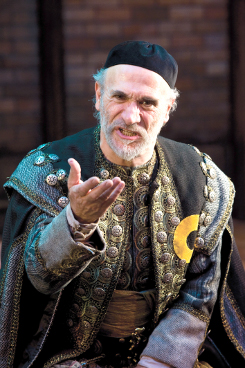
Tony Amendola as Shylock, wearing all black and with a dark yarmulke over his gray hair, stands stage right with Bassanio. Amendola's Shylock is a brilliantly textured blend of natural emotions and an array of expressive mannerisms, the usurer's potent intellect and powerful pride evident in his effusive personality and resonant speech. Amendola displays an expert command of language and a beautiful rhythm to speaking, and he delivers a masterful evocation of a deeply injured businessman whose anger and long-time humiliation realistically give rise - "cursed be my tribe if I forgive him" - to tragically stubborn insistence on ghastly vengeance. Shylock's polite and almost deferential response to Antonio belies his words - "I hate him" - and Ott depicts the arrogant and condescending Christian merchant as something of a mirror image, with the crabby-faced Antonio acting superior to the point of conceit, pompously wearing a hat and fur collar, and treating Shylock rudely in almost juvenile fashion. Amendola's Shylock, earnestly trying to express the depth of his feelings, slaps himself in the face to demonstrate how he has been disgraced, laughs off the bond of a pound of flesh as "a merry sport," then slyly demonstrates how he will take his bond by making malicious scissor-cut motions with his fingers. After the deal is sealed, the handsome Bassanio stops Antonio from shaking hands with Shylock, but Antonio, in condescending to the Jew, insists upon a solemn shake.
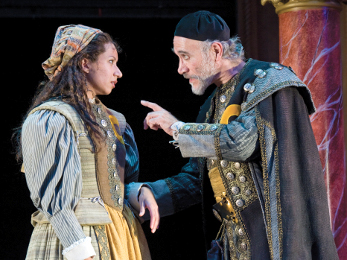
Subsequent scenes supply some comic relief, but with interesting undertones. Launcelot Gobbo, looking to leave Shylock's employ, jests while wearing a crude Mardi Gras-style mask - the same as worn by Benedick in the masque scene of the Festival's in-repertory Much Ado About Nothing - and follows Bassanio stride for stride as if from a Marx Brothers skit. In 2.3 he is given a ducat by Jessica to deliver a love letter from her to the Christian Lorenzo, and he fans his eyes in feigned tears at the romantic notion, but after Lorenzo himself walks the stage railing like a tight-rope, the gravity of the two conspiracies against Shylock becomes evident. Lorenzo celebrates his deceit of Shylock with Bassanio and Gratiano, the latter stumbling drunkenly on the stairs and swilling liquor from a flask, unable to remember the concluding word "amen" until reminded by Bassanio. After Launcelot, on his belly in the balcony, makes Lorenzo leap repeatedly for his letter, the now less-than-appealing Christian heroes exit, and Amendola's Shylock returns, humming and rubbing at his temples, knocking solemnly on the wooden railing to dispel an ill omen. When Jessica demurely embraces him, it is with a deceit and apparently feigned affection that unsettles. The boys return to a darkened stage for the 2.6 escape, drunken and loud and uncouth, Lorenzo wielding a torch. When Jessica drops her luggage to them from the balcony, they make their escape, but Bassanio must first rouse the passed-out Gratiano. When Shylock arrives, ominous music underscores the moment, and Amendola's Shylock cries his daughter's name in a heartbroken and tortured plea.
Portia's 2.7 and 2.9 romantic treasure-chest sequences are depicted back to back, with Ott wisely doubling the comic relief and romantic mood, and shifting the 2.8 and 3.1 revelations from the merchants to just before intermission. Trask's Portia remains refined and gorgeous, Nerissa at her side, throughout the outrageous wooing from the Prince of Morocco. He shouts "by this scimitar!" then lunges at and spars with his assistant before dancing with him, and the ladies struggle to suppress giggles. Drawn by the golden casket, the absurdly accented Prince speaks of "adwantages" in gold earrings before studying the other chests, pronouncing "sill ware" for silver and referring to "this t'ird in lead." When he opens the gold casket - "oh hell!" - he finds only a gourd and the decree of his loss. Next, the equally outrageous Prince of Aragon appears at the top of the stairs, descending in awful stop-and-go dance steps to guitar accompaniment from an assistant. With Portia now kneeling downstage center in prayer, the Prince dances past her to the silver casket, comically wiggling his bottom for her. After stopping the guitarist's strumming more than once so he can concentrate, the Prince opens the silver chest to find the "portrait of a blinking idiot," and he and the guitar player stomp offstage in an outraged huff. Trask's Portia rises gleefully, and she and Nerissa look at each other and stomp their feet as well, but in relieved happiness.
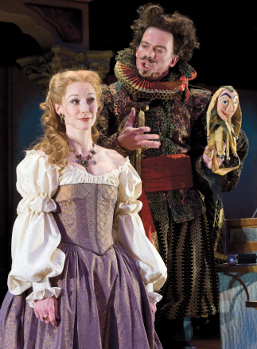
Ott expertly darkens the romantic comedy with the merchants in 2.8 and 3.1. Salerio and Solanio speak of Jessica's flight, and when Amendola's furious Shylock accuses them of treachery - "you knew!" - they seize his cane and pull his yarmulke cap off, then toss it back and forth in a bully's playground game. Amendola's Shylock kneels and kisses his cap, and when they reveal Antonio's financial disasters, he responds reflexively with vengeful anger: "let him look to his bond." When they exit, Shylock throws down his cane, claps his hands at the news, and giggles, but in a moment he is overwhelmed and sags to the stage, crying softly at the loss of Jessica. Ott concludes the scene with rising music as the entire cast re-enters to pose in stage portraits for intermission.
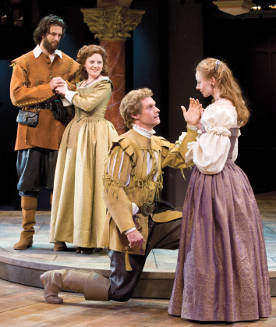
The second act begins as the first ended, with cinematic music and the entire cast posed onstage. In sudden movement, everyone shifts, and Bassanio is spot-lit in a dramatic pause upon the stairs. The romantic game-playing seems shallow in comparison to the gripping drama just before intermission, and Nerissa and Gratiano flirt and gaze into each other's eyes on the stairs as Trask's Portia implores Bassanio to not choose yet: "I would deliver you some ... months or two." While Bassanio - with an almost mock-solemnity - moves slowly from casket to casket, Portia kneels downstage again, this time with tears in her eyes and her hands clasped in hope. When Bassanio succeeds, Trask's Portia gives him her ring - as Nerissa does with Gratiano - and they kiss to spontaneous audience applause. The romantic triumph is short-lived, with Ott casting shadows - a racial reference to Lorenzo "and his infidel" Jessica, Gratiano snapping his fingers to curtly command Nerissa - that becomes a pall with the bad news regarding Antonio. Bassanio becomes so incensed he grasps Salerio by his ruffled white collar and must be restrained. Ott then spotlights Antonio above in the balcony, looking frightened and even more downhearted, and he sadly "reads" his letter to Bassanio aloud. When he is brought to the stage in manacles by an officer, Shylock appears to make his demands - "I'll have my bond" - and Antonio lurches as if he will collapse and must be supported.
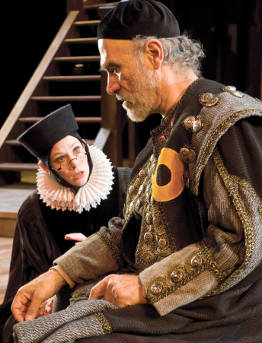
After snippets from 3.4 - Portia using a phallic finger gesture to demonstrate her plan to attend the trial as a male attorney - and from 3.5 - Lorenzo and Jessica in a stage left spotlight, she becoming regretful and melancholy - Ott launches into the central 4.1 trial scene. Dramatic music rises as banners are unfurled from the balcony railing and the Duke appears in white robes and hat, with dark eyes and a haggard expression. When Amendola's Shylock takes the stage wielding his scales for Antonio's heart, he is blocked menacingly by the glowering Gratiano, and Antonio must restrain Bassanio from assaulting him. In refusing even overpayment, Shylock pulls a knife - "shall I have it?" - and after Gratiano graphically spits on him downstage center, the saliva graphic and real, Nerissa appears in a white collar and a slight mustache, her hair covered, preceding a prim Portia in glasses and black robes.
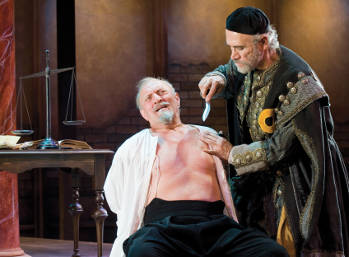
Amendola's Shylock, slightly stooped and glaring of eye, seems driven by outside forces toward his quest for revenge - "I will have all my bond" - and his stating of his name is bold and proud and defiant, much like the Danish prince's, "it is I, Hamlet the Dane." After Trask's Portia delivers her stirring call for mercy, Shylock remains resolute, and Ott shows Antonio's supporters gathered stage left, hanging their heads, exclaiming, throwing their hands in the hair, and shaking their heads sadly. Antonio kisses a Bible and sits in a spot-lit chair at center stage, and when he opens his shirt to bare his breast for Shylock's knife, Amendola moves aside Antonio's crucifix chain with his blade. After Portia and Nerissa bristle in displeasure at the heartfelt emotion expressed for Antonio by both Bassanio and Gratiano, the music rises to a crescendo as Amendola's Shylock prepares to cut. But Portia saves the day with her admonition that no blood can be spilled, and Bassanio moves protectively in front of the merchant. Gratiano yelps a gleeful "whoo!" but becomes violent, seizing Shylock and knocking him down to the stage - "beg!" - then beating a drum-rhythm on the old man's back. The Duke heaps injustice upon the justice, the Christians showing no mercy after begging for mercy for themselves, and when he requires Shylock's immediate conversion to Christianity, Antonio smugly hangs his crucifix around the neck of Amendola's exasperated Shylock. To complete the victory, Gratiano uses his own crucifix to feign Shylock hanging in the gallows, and the exultant Christians exit, leaving a shell-shocked Shylock vanquished onstage, deprived of his bond and his principal, of his fortune, and even of his faith.
Ott concludes her thoughtful production with insightful imagery. After Bassanio and Gratiano surprisingly surrender their love-token rings 4.2 in tribute to the team of lawyers, Lorenzo and Jessica are shown in somber moonlight on the darkened stage, sad music playing as Jessica breaks down crying. When the men return from the trial they find their beloved women angry - Portia quite cold, Nerissa glaringly mad - and Bassanio and Gratiano sweet-talk their way to a happy ending. Nerissa slugs Gratiano on the arm in a comic response to Gratiano's punching her when she was disguised as the male attorney, and slapping "him" on the back when they exited the court room. He heaves her over his shoulder and they rush offstage with his roaring shout, and music rises as Antonio clasps hands with Bassanio. The happy ending is not quite so happy, however, as Jessica doubles over upstage, now sobbing openly and chanting in Yiddish, and the chilling moment is incisive in its pointed reminder that there may be revenge, but there is no justice.